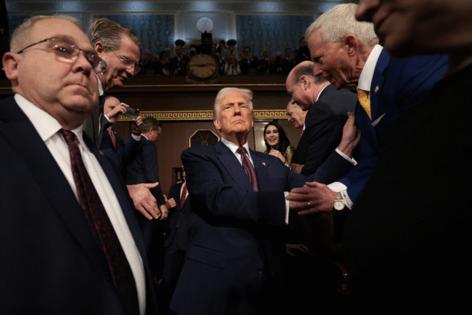Analysis: Trump's tariff policies complicate Republicans' turnout dilemma
Published in Political News
WASHINGTON — President Donald Trump’s ever-changing tariff policies have rocked the stock market, but they could also complicate Republicans’ effort to maintain their majorities on Capitol Hill.
While a volatile or slumping economy is an obvious political risk for the party in power ahead of an election, there’s more nuance to Republicans’ specific challenge in the upcoming midterms.
Republicans have a turnout problem. They are now the party of lower-propensity voters, and there’s no guarantee that the coalition that elected Trump to a second term will turn out for other Republican candidates in elections when the president isn’t on the ballot.
The most recent evidence for this dynamic came from the two recent House special elections in Florida, where the winning Republican candidates won by half the margin Trump earned against Kamala Harris just five months ago; and in the high-profile Wisconsin Supreme Court race, where the candidate backed by Democrats won by 10 points in the nation’s most evenly divided state, which Trump won in 2024.
One of the key ways Republicans can overcome their admitted turnout challenge is to couple Trump with congressional Republicans and convince voters that it is in their interest — and the president’s — to reelect Republicans and send more Republicans to Washington to implement Trump’s agenda.
But that could get complicated if GOP lawmakers on Capitol Hill try to rein in Trump’s ability to wield tariffs. While that might restore some stability to the economy in the short term, it would risk alienating voters who trust Trump more than they do other Republican politicians. At least some Republican voters would label GOP opposition on the Hill as the political establishment trying to block the mandate of their chosen outsider (Trump).
What would compel Trump-first voters to vote in an election for Republicans who oppose the president’s authority, particularly an election when Trump isn’t on the ballot?
Those Trump-first voters aren’t likely to support Democrats, but not voting would have an impact on the election. If Republican and Democratic voters turn out at equal levels in 2026, the GOP could expand its Senate majority and have a chance at holding the House.
But if GOP turnout dips, Republican candidates would have to make up for that with independent voters. That would be difficult considering independents supported Harris over Trump by 3 points last fall, when Democrats were shouldering the blame for the economy. Those voters would be even less excited about supporting Republicans if economic conditions don’t improve with the GOP in full control of Washington.
Republicans have apparently learned the wrong lesson from the 2024 elections. Rather than concede that the results were a refutation of the Biden administration, Trump has claimed a mandate. Not only does he believe voters want him to do everything he said he was going to do, but Trump seems to believe voters have completely thought through those policies and are willing to stick by him even if his actions make their lives more difficult or more expensive.
The White House has also overestimated Americans’ appetite for short-term pain. Of course, Democrats don’t have any tolerance for it, but independents likely have Republicans on a short leash. On the campaign trail, Trump promised immediate prosperity and yet is delivering something very different. Even some Republicans will grow anxious with the pain; it’s just not clear what or when a broader GOP revolt against Trump might occur.
There’s tension within the GOP because Trump will not face voters next year, so any potential backlash would be borne by congressional Republicans. But decoupling themselves from the president probably won’t work because they’ve been supporting him for years and they need his Trump-first voters. Elected Republicans are effectively at the mercy of their chosen leader. The same candidate who helped them gain power could be the one who helps them lose it.
Even though the Senate map of competitive races and the math to the majority initially favors Republicans, there are ingredients for a larger Democratic year that could put control of the chamber at risk. An excited Democratic base, independent voters opposing Republicans and a divided or depressed GOP would be the recipe for Democratic midterm success.
The good news for Republicans is that the midterm elections are still more than a year and a half away. But they better hope the pain subsides with plenty of time for voters to feel the gains before voting in the fall of 2026.
_____
©2025 CQ-Roll Call, Inc., All Rights Reserved. Visit cqrollcall.com. Distributed by Tribune Content Agency, LLC.




























































Comments